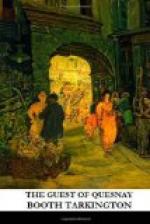He is a white-haired, fat old fellow, always well-shaved; as neat as a billiard-ball. In the daytime, when he is partly porter, he wears a black tie, a gray waistcoat broadly striped with scarlet, and, from waist to feet, a white apron like a skirt, and so competently encircling that his trousers are of mere conventionality and no real necessity; but after six o’clock (becoming altogether a maitre d’hotel) he is clad as any other formal gentleman. At all times he wears a fresh table-cloth over his arm, keeping an exaggerated pile of them ready at hand on a ledge in one of the little bowers of the courtyard, so that he may never be shamed by getting caught without one.
His conception of life is that all worthy persons were created as receptacles for food and drink; and five minutes after my arrival he had me seated (in spite of some meek protests) in a wicker chair with a pitcher of the right Three Pigeons cider on the table before me, while he subtly dictated what manner of dinner I should eat. For this interval Amedee’s exuberance was sobered and his badinage dismissed as being mere garniture, the questions now before us concerning grave and inward matters. His suggestions were deferential but insistent; his manner was that of a prime minister who goes through the form of convincing the sovereign. He greeted each of his own decisions with a very loud “Bien!” as if startled by the brilliancy of my selections, and, the menu being concluded, exploded a whole volley of “Biens” and set off violently to instruct old Gaston, the cook.
That is Amedee’s way; he always starts violently for anywhere he means to go. He is a little lame and his progress more or less sidelong, but if you call him, or new guests arrive at the inn, or he receives an order from Madame Brossard, he gives the effect of running by a sudden movement of the whole body like that of a man about to run, and moves off using the gestures of a man who is running; after which he proceeds to his destination at an exquisite leisure. Remembering this old habit of his, it was with joy that I noted his headlong departure. Some ten feet of his progress accomplished, he halted (for no purpose but to scratch his head the more luxuriously); next, strayed from the path to contemplate a rose-bush, and, selecting a leaf with careful deliberation, placed it in his mouth and continued meditatively upon his way to the kitchen.
I chuckled within me; it was good to be back at Madame Brossard’s.
The courtyard was more a garden; bright with rows of flowers in formal little beds and blossoming up from big green tubs, from red jars, and also from two brightly painted wheel-barrows. A long arbour offered a shelter of vines for those who might choose to dine, breakfast, or lounge beneath, and, here and there among the shrubberies, you might come upon a latticed bower, thatched with straw. My own pavilion (half bedroom, half studio) was set in the midst of all and had a small porch of its own with a rich curtain of climbing honeysuckle for a screen from the rest of the courtyard.




